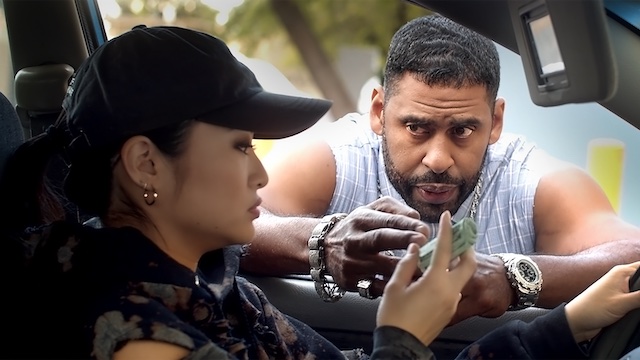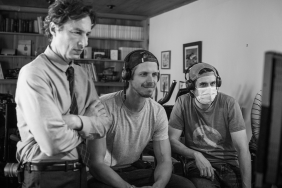Take Out Girl focuses on the life choices of Tera Wong, a student turned drug hustler that is attempting to provide for her struggling family. Releasing May 18 on digital storefronts, the thriller stars writer Hedy Wong in the lead role. It follows her profitable rise and subsequent fall from grace as she searches for the American dream in one of the few ways presented to her.
Hedy Wong Isn’t Your Model Minority
“I think Asians in the United States were always seen as outsiders,” Wong says of the stigmas that face Asian Americans. “I think the model minority myth was really not to help us so much but used against other minorities, you know? Before that, we were in the 80s with the Black Panther movement. We were the Yellow Peril. [We’re] the model minority, we’re the virus or Yellow Peril… They [are all] dehumanizing because it’s all stereotypes.”
Wong hopes her thriller, which is based on her own experience growing up in the Bay area and working a side hustle, can show that all communities have issues and similarities.
“You have to show their grace and their mistakes. That’s what makes them all human. You can’t paint us as just a model minority, you know? We’re everything else too, just like everybody else, you know? I think these crimes against Asians, it started with the virus, but the racism, in my experience, has always been there. There’s always been a status quo of these sentiments about Asians, and it just only took a certain event that sparked it up again.”
Hisonni Johnson Wants to Shatter Misconceptions
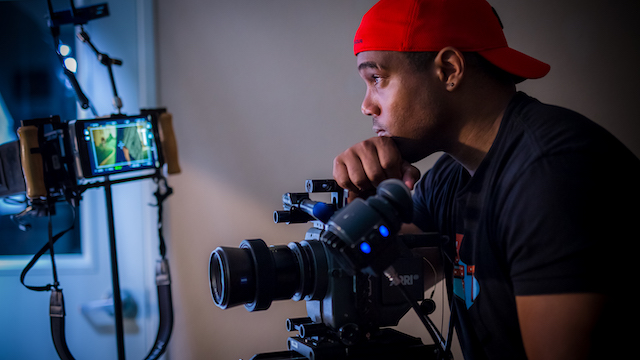
Helping bring Wong’s vision to life is director Hisonni Johnson, a product of Milwaukee, Wisconsin, the most segregated city in America. Johnson likens his filmmaking to MythBusters, the hit show featuring Adam Savage and Jamie Hyneman that saw them test popular myths with science experience. However, Johnson is dealing with much more hard-hitting myths that deal with race, class, and society at large.
“I’m a narrative filmmaker, obviously not a scientist, but I think I take that MythBusters‘ sorta perspective on storytelling,” says Johnson. “Especially when regarding underrepresented communities. I do my best to have a strong no monoliths policy in my film. So if I show one side of a person, I have to show the other side of them because I believe everybody is kind of yin and yang.”
Since Take Out Girl has a minority-led cast filled with Asian Americans and African Americans, Johnson stressed that it was important to be as realistic as possible, which meant not having a villainous foil for Wong.
“Everyone you meet is a bit more complicated than the moment you get to spend with them,” the director explained. “If you judge them based on that, you definitely wouldn’t get the full picture. So I guess my goal as a narrative filmmaker is to bring as much that reality. To make sure that everybody’s fully fleshed out and made sure that everybody’s backstories and motivations are very well fleshed out. And it’s really, really important in the case of Asian Americans, African Americans, and Latino Americans because so much of who we are is still [misunderstood]. The more I reveal in this film and unveil layer by layer, the more empathy and understanding we may have from people who don’t know what we’re like or where we’re from.”
For Wong, it was also important to make sure every character had depth as many were based on real people that she knew.
“It came from a real, authentic place,” said Wong of Take Out Girl‘s cast of characters. “To make it easier on myself, I just wrote on what I know, and then when I met his Hisonni, we started to streamline the storyline and just polished up everything. He helped me center the story more on the family, and I’m just really happy that he also saw what I was doing, and he just amplified everything. Something that we both agree on is that nobody’s a villain in this movie. They can’t be because, because I don’t see those people as villains in my life.”
Wong sees society itself as the villain rather than anyone in the film, but she also wants to own her own choices and not promote a life of crime.
“You know, It’s societal pressures [that’s the villain]. It’s also the pressure of a young girl who decided to make the choices that she did at that time. Hisonni always describes it as poverty is the villain, and that’s true, but I also want to take accountability for Tera because Tera decided to go down that route too. She made those choices. Tera was not a victim of anything. She made those choices within that environment.”
The Impact of Segregation
Johnson’s upbringing in Milwaukee has given him a mission as a filmmaker to tell the stories of the underrepresented.
“As a Black man, I consider it my duty to tell stories about the African-American experience, but as a Black man who has always been extremely interested in everybody else’s cultures and what makes us alike, I find it as my absolute honor and pleasure to demonstrate worries about any underrepresented community,” Johnson said. “Milwaukee kind of bred that in me because again, like some people go one way. If you separate people, they become very leery of the others. In my case, it made me more interested. I was wondering why we were so separated.”
Living in an impoverished area taught Johnson that what he saw on television wasn’t exactly true and that there was more to everybody’s story than what was often overly simplified.
“The zip code that I’m from, 53206, is the area where there were more Black men are incarcerated per capita than any other place in America,” reveals Johnson. “So I grew up in a very impoverished area. In the early 90s, crack destroyed the area, and there were thugs in the area. I remember watching Hillary Clinton on TV referred to, you know, me and everyone else in my area as super predators. And I eventually watched all of these thugs ‘disappear,’ but I think they didn’t quite realize that those gentlemen were an important part of the ecosystem of that area.
“Yes, they were drug dealers, but they were also the people who loaned you cash or gave you money when you could get your car to start to get to work. Or for me as a child, when my mom couldn’t afford field trips, they would pay for them, or when we were hungry, they would pay for [food]. They made it look like a legitimately viable 9-5 essentially, and it looks very, very appealing. I think whenever you’re in a situation as desperate as Tera’s [in the film], or as desperate as mine was when I was young, you start to look for an easier way out, even though it may not be the right way out.”
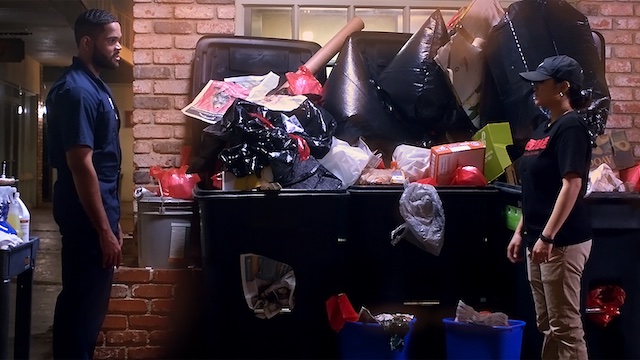
More Than Their Mistakes
One of the nicest characters in the film is Nate, an ex-convict played by Dijon Talton that winds up being Tera’s romantic interest. He constantly helps out her mother in taking out the trash despite no gain for himself, and this was a conscious decision to show that characters aren’t defined by their mistakes in life.
“[It was] to show that people never were what we thought they were,” explained Johnson. “Nate is 1000% the thugs I saw on the corner of my block that disappeared. You could kind of stereotype them. They looked a lot like members of the rap group, NWA. You know, the Jheri curls, the baggy pants, the hats, and although they weren’t in plain view, if you stuck around long enough, you would see the guns. But when you got to know them, like I was a child when these gentlemen were being incarcerated, chased down by cops. In certain cases, the police would even do catch and release where they would just [catch them] and then let them go out and do it again so they can grab it again the week.
“What people didn’t know is that these boys, like I said, they were a genuinely important part of the ecosystem because, for me, I didn’t have a dad around. So these guys were like my bigger brothers. These guys were the guys who really picked up the slack. They had a heart, you know? Then when you got to know them, you understood that they had kids at a young age. We’re just trying to find a way to take care of their daughters and their sons. They’re sick moms and their grandparents. So everyone has a story. And it’s my hope that this film sheds light on those stories and reveals that people were more than just their biggest mistakes so that their actions can be judged with more than just punishment. It could be judged with actions that actually are helpful.”
Wong also explained why people turn to a life of crime and why a side hustle is alluring.
“Some of my family members, they’re not educated. They came from a third-world country. They weren’t going to be [happy] working minimum wage jobs forever, you know?” explained Wong. “So sometimes they have to find another way if they want to be their own boss. I get a little awkward sometimes telling this because I don’t want to promote a certain lifestyle at all because the risk is so much higher than the rewards.
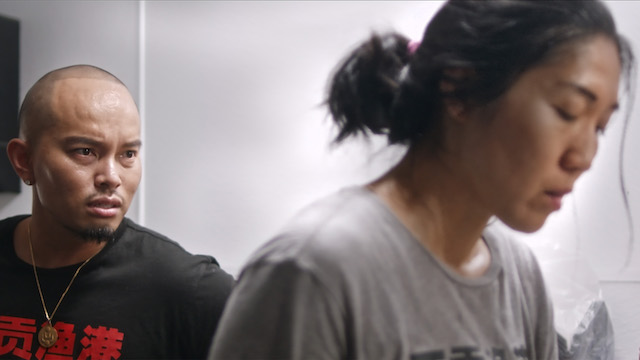
Take Out Girl Is a Love Letter to Moms
During the film, Tera is constantly caring for her hard-working mother, who runs a Chinese restaurant. Never getting a day off or a break from work, Tera’s mother is the backbone and provider for the family. With little in terms of upside financially, it’s clear that she’ll work every day until she passes away. It’s a bleak reminder of a problem that many families face, and Take Out Girl explores the bonds of family.
“Growing up with a single mom, four sisters, and myself, so five kids, I watched this woman turn a dime into a dollar on a daily basis,” Johnson says of his mother. “I mean, from the way she fed us to the way we celebrated the holidays, it was a miracle that she made it happen every single time because there just wasn’t enough to go around. Yet, I turned out okay. Telling the story of Take Out Girl, which is essentially a love letter to moms and a flat-out demonstration of our perspective on what a child would do for their mother, it was an absolute honor to do that. I think my mother, if she was still around, would be very proud of this film.”
Many members of Wong’s family are immigrants with little schooling, which meant that they had limited avenues to explore when it comes to working.
“They couldn’t get another job that was going to be great,” said Wong. “They can barely speak English. What kind of jobs could they get? [They can’t get a job] that was gonna really take care of the family, and leave them where they don’t have to work three jobs and never see their kids … At the end of the day, we all have a family. They may be making their money in an unconventional way, but they’re not bad people [due to that]. They’re just raising their money in a different way. They bring it back to the family, they help out people, help out friends. They’re not bad people at all. Just because of the circumstance, they just decided to make money that way.”
Criminality Isn’t Black or White
Ultimately, Johnson and Wong hope that they can add a gray area to the idea of criminality and show that everyone has more in common than they might think.
“We touch upon whether criminality is nature or nurture. We touch upon interconnected communities,” says Johnson. “I hope people take from the film that we’re all more connected than we think. Even though someone may [not] look like the other, you probably have way more in common with them than you would assume. So it’s best to treat people as if they’re closer to you than you know. I would love for people to watch this film, and if they empathize with Tera at all, if they think she’s a smart character, she has potential, or if you find yourself rooting for her as she does things that are illegal, that you evaluate your position and your idea of criminality. The idea that maybe criminality isn’t black and white. If Take Out Girl adds a gray to the idea of criminality, then this was a successful film.”
Wong, who began writing the film during an unhappy time in her life, hopes people can relate to her personal struggles and come out of Take Out Girl with two key messages.
“When you’re going through tough times, you often feel alone in your suffering. I started writing this because I was hoping that this movie contains so many lights, like the meaning of the movie has changed for me over the years,” admitted Wong. “But when I first started writing this movie, I was hoping that when people watch it or just feel less alone in their struggles, and also the underlying message also is not all money is good money. So No. 1, we’re not alone in our struggles and our mistakes, and No. 2, not all money is good money.”
